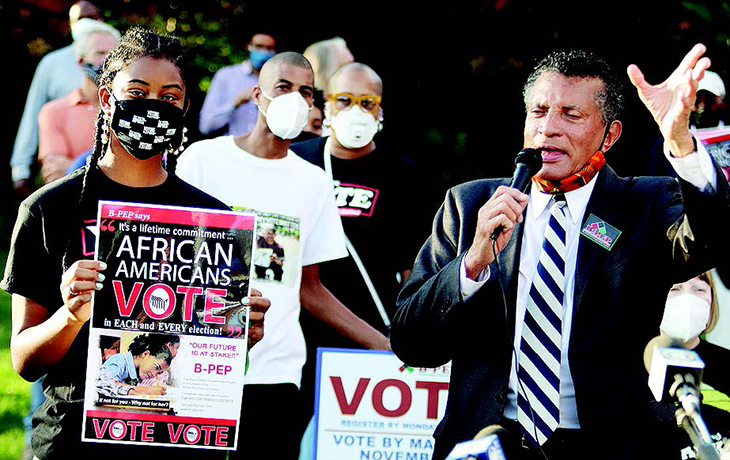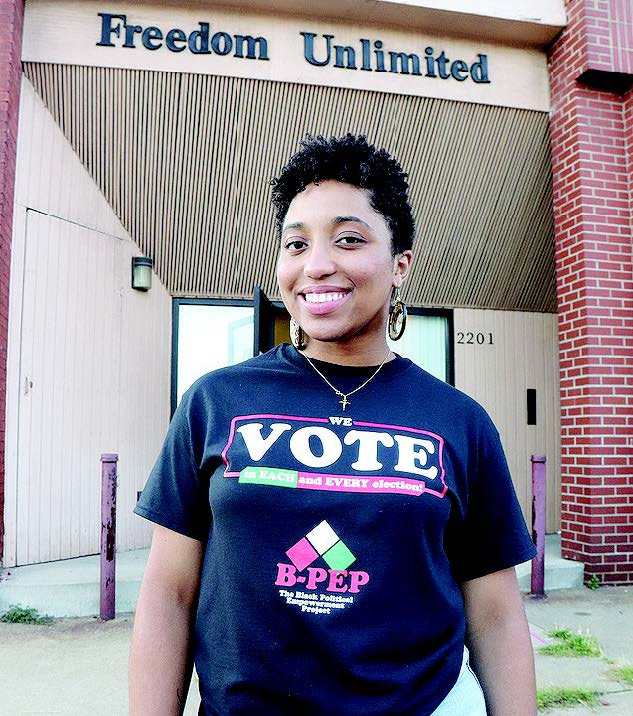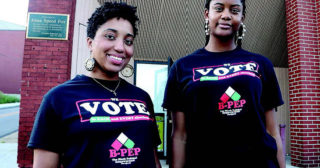Poll shows 18-to-29 year olds enthusiastic about Presidential Election
by Rob Taylor Jr.
Courier Staff Writer
We’re less than two weeks away from possibly the most important presidential election in American history, and all across the country, young people have invited themselves to the party.
Shalaya Minor, a senior at Carnegie Mellon University, would bring Netflix and some popcorn to the polls if she could. The politics, international relations and psychology major from Philadelphia told the New Pittsburgh Courier she’s sure to vote in this Nov. 3 Presidential Election.
“I’m thinking, who is going to impact my future in a positive way, who is going to impact my children’s future in a positive way,” Minor said. “Am I still going to be in debt? Am I still going to continue the same cycle of oppression that the Black community has been living in, or do I see a way out with some of the certain candidates that are out there?”
Minor, 21, said she has been doing research on the major party presidential candidates Donald Trump and Joe Biden. She didn’t tip her hat on which candidate would win her vote.
Neither did Calyx Deroche, 22, a graduate of Point Park University. But the only certainty is that Deroche will vote in the coming election. Deroche, who is from Atlanta, said she attended both presidential inaugurations of Barack Obama in 2009 and 2013. As soon as she turned 18, she became a registered voter, and voted in the 2016 Presidential Election as a freshman at Point Park.
“I felt very hopeful and I felt like I had been a part of history,” Deroche told the Courier during an exclusive interview, Sept. 3. “The outcome wasn’t what I anticipated, and it was quite scary and depressing like it was for the majority of the people who voted with me, but it was very exciting to finally have a say in an election.”
Traditionally, voting habits among 18-to-29 year olds haven’t been, well, much of a habit. But a national Harvard Institute of Politics poll released in September revealed that 63 percent of the respondents 18-to-29 would “definitely be voting” in the coming election. Only 47 percent of respondents in the age group said they would definitely vote in the 2016 Presidential Election.

SHALAYA MINOR holds up the sign promoting everyone to vote in the upcoming Nov. 3. Presidential election, during a rally sponsored by Tim Stevens’ Black Political Empowerment Project, Sept. 3, in the Hill District. (Photos by Courier photographer J.L. Martello)
For young voters, though, they are sandwiched in the middle of a tumultuous time in American history and politics. Young voters have been exposed to the increasing divisiveness that President Trump has been accused of creating in the country, especially pertaining to race. In 2017, Trump’s first year in office, he said there were “very fine people on both sides” after White supremacists squared off with opposing protesters in Charlottesville, Va.
A White man deliberately drove his car into a crowd during the “Unite The Right” rally in Charlottesville, killing another White person, Heather Heyer. She was just 32.
“She was trying to be a voice of reason, and happened to be in the wrong place, when that guy decided to do what he did,” Heyer’s father, Mark, recently said to Bay News 9 TV in Tampa, Fla. “She was a part of me that I will never get back. Hate doesn’t do anything but divide, destroy, and bring destruction.”
Racial tensions were magnified this year when a White Minneapolis, Minn., police officer placed his knee on a Black man’s neck for nearly nine minutes, leading to his death. The video of what’s known as the George Floyd Incident was viewed billions of times and led to an uprising in this country. Since the Memorial Day incident, it’s been people on the younger end of the spectrum that have led peaceful (and sometimes not peaceful) protests, and a demand to end racism.
It was President Trump who seemed to have a hard time denouncing White supremacy when asked to do so during the first presidential debate, Sept. 28, in Cleveland.
It was President Trump who never met with the family of George Floyd, while Biden, the Democratic candidate, did.
Young voters also have been exposed to the coronavirus pandemic. It’s caused many young people to lose their jobs, and look at life a little differently. Do young voters feel that President Trump did a good job handling the pandemic? Or do they feel that his initial disgust with wearing a mask caused even more deaths in the U.S.?

CALYX DEROCHE, 22, a 2019 graduate of Point Park University, is excited to vote in the upcoming presidential election. She first voted in a presidential election in 2016: “I felt very hopeful and I felt like I had been a part of history. The outcome wasn’t what I anticipated, and it was quite scary and depressing like it was for the majority of the people who voted with me, but it was very exciting to finally have a say in an election.”
The more young voters that turn out in an election, the better it is for liberal-leaning Democrats, history has shown. No one found that more true than Vermont Senator Bernie Sanders, who, at one time, was the leading Democratic presidential nominee in late 2019.
“Young people are the most progressive generation in history. If young people voted at the same percentage as older people, they could transform this country,” Sen. Sanders said at a CNN Presidential Town Hall in 2019.
Senator Sanders had a huge following with young people, particularly college students, with his overly-left-leaning philosophy. But the senator didn’t have the magic touch with Black voters, who went in droves to Biden, who was Obama’s vice president during his presidency.
Biden eventually became the Democratic front-runner, and with the Black and young people’s combined vote, it could be the recipe to overtake Trump’s solid base of supporters.
Minor and Deroche are part of the wave of young African Americans in the Pittsburgh area who want their vote counted in this election. Minor and Deroche are working with Tim Stevens’ Black Political Empowerment Project organization, which has advocated African Americans voting in every election for decades.
“The difference in the election can make or break between 100 people and 1,000 people, so if we all vote, we can have an impact,” Minor told the Courier. “…We always want to preach ‘Black Lives Matter,’ but voting is also a part of that, to show that we are important citizens with an opinion and can make a change in the United States.”
 CALYX DEROCHE AND SHALAYA MINOR are two of the many young African Americans who have committed to voting in the upcoming Presidential Election, Nov. 3. Some have already submitted their mail-in ballots; others will roll to the polls on Election Day. (Photo by J.L. Martello)
CALYX DEROCHE AND SHALAYA MINOR are two of the many young African Americans who have committed to voting in the upcoming Presidential Election, Nov. 3. Some have already submitted their mail-in ballots; others will roll to the polls on Election Day. (Photo by J.L. Martello)